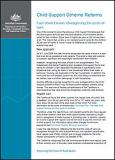Fact sheet Eleven: Recognising the costs of care
One of the concerns about the previous Child Support Scheme was that the child support formula was the same whether a non-resident parent cared for their children 29 per cent of nights per year or did not see them at all. This meant that, unless a non-resident parent cared for the children 30 per cent of nights or more it made no difference to how much child support they paid.
New approach
As of 1 July 2008, the new Scheme recognises the costs of care in a way that is as fair as possible to both parents. This aims to help both parents to maintain significant and meaningful contact with their children.However, recognising the costs of care is not straightforward. The independent Ministerial Taskforce that reviewed child support found that caring for children in two separated households is significantly more expensive than caring for them in one household. Many fixed costs, in particular, housing, are duplicated in the two households. In addition, the more care the non-resident parent has, the more likely it is that there will be clothes, toys and other belongings in both households.
Another difficulty in giving recognition to care arrangements in the Child Support Scheme is that it may increase conflict between parents about money. This was one of the key considerations of the Taskforce in recommending how care should be recognised under the new Scheme.
Regular care
The Taskforce found that when a parent has regular care of a child, that is between 14 to 34 per cent of the time (52 to 127 nights per year), they incur about 24 per cent of the total costs of their child. For more information on the costs of children see Fact sheet Ten: The new child support formula and the costs of children.Therefore, under the new formula, non-resident parents who have regular care of their children have their child support liability reduced by 24 per cent in recognition of costs incurred in providing care. In addition, parents on income support with regular care do not have to pay the minimum rate of child support. For information about other changes to minimum payments see Fact sheet Twelve: Minimum payments.
Under the new Scheme, reflecting the fact that the costs of care are recognised through the child support formula, non-resident parents who have regular care of their children are no longer eligible for the child related components of Family Tax Benefit (FTB).
The Taskforce recognised that low income parents who have regular care of their children and, in the past, have received a substantial proportion of FTB, would be affected by the changes to FTB. Because of their lower incomes, these parents generally pay lower amounts of child support. Therefore a 24 per cent reduction in child support in recognition of the regular care these parents provide may not offset their reduction in FTB.
For this reason, lower income paying parents with regular care continue to be eligible for the Rent Assistance component of FTB Part A and other government benefits, such as Child Care Benefit, a Health Care Card and the lower threshold for the Medicare Safety Net.
In July 2006, parents on Newstart or other related payments also became eligible for the 'with child' rate of the income support payment if they have 14 per cent or more care of their child (52 nights or more per year).
For more information about changes to FTB see Fact sheet Seventeen: Changes to Family Tax Benefit (FTB).
Shared care
If a parent has 35 to 47 per cent care (128 to 175 nights per year) they are recognised as meeting 25 per cent of the costs of care, plus two per cent for every percentage point over 35 per cent care.If a parent has 48 to 52 per cent care (176 to 189 nights per year) they are recognised as meeting 50 per cent of the costs of care.
If a parent has 53 to 65 per cent care (190 to 237 nights per year) they are recognised as meeting 51 per cent of the costs of care, plus two per cent for every percentage point over 53 per cent care.
Primary Care
If a parent has 66 to 86 per cent care (238 to 313 nights per year) they are recognised as incurring 76 per cent of the costs of care.Sole Care
If a parent has 87 per cent care or more (314 to 365 nights per year) they are recognised as incurring 100 per cent of the costs of the child.
Child support care and cost table
| Child support care percentage |
Equal to number of nights a year |
Equal to number of nights a fortnight |
Care Level | Child support cost percentage |
|---|---|---|---|---|
| 0-13% | 0-51 nights | 1 night | Nil care | Nil |
| 14-34% | 52-127 nights | 2-4 nights | Regular care | 24% |
| 35-47% | 128-175 nights | 5-6 nights | Shared care | 25% plus 2% for every percentage point over 35% |
| 48-52% | 176-189 nights | 7 nights | 50% | |
| 53-65% | 190-237 nights | 8-9 nights |
51% plus 2% for every percentage |
|
| 66-86% | 238-313 nights | 10-12 nights | Primary care | 76% |
| 87-100% | 314-365 nights | 13-14 nights | Sole care | 100% |
Please note this fact sheet is for general guidance only. It should not be treated as a complete or authoritative legal statement.
More details about these changes can be found in other fact sheets and on the Child Support Agency website
More information on the Taskforce and how the reforms started is available on this website under Ministerial Taskforce on Child Support.
Last updated:

